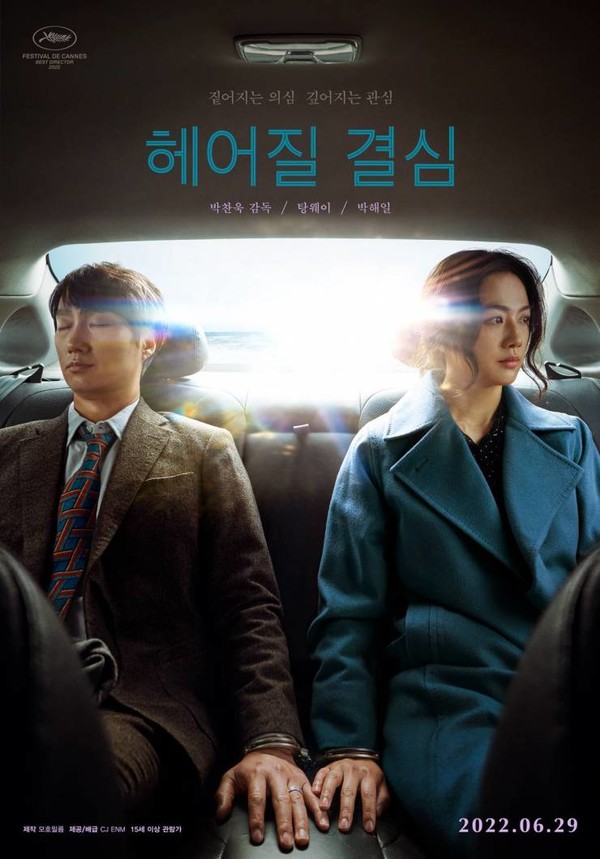The story told in Decision to Leave is aching. And it is yet to be completed.
Penned by Chung Seo-kyeong and Park Chan-wook, and directed by the latter, the film is a two-hour-long narrative of a seemingly coincidental but destined couple, Hae-joon and Seo-rae, their history, present, and open-ended future that started to collapse as soon as the two lovers’ paths crossed. Together with positive critic and audience reviews, Decision to Leave won renowned awards at home and abroad, including Park’s Best Director Award at the Cannes Film Festival held in France.

The creators of the story take us through a captivating plot that is densely woven. But strangely, the audience feels the need to tamper with the seemingly perfect ending and complete Hae-joon and Seo-rae’s story themselves. This is perhaps what the writers intended; the audience is left with lingering emotions and remains immersed in the story long after sitting through the closing credits.
Hae-joon and Seo-rae’s love is outwardly illicit, adulterous, and poisonous. The audience can’t help but find themselves justifying the ironic and unavoidable romance, even while they acknowledge that it is ethically unacceptable in many ways. The film pushes the audience to a dead end by revealing the ambivalent mix of deep and sincere emotions engraved in their affair that gives grounds for their love. The audience starts to contemplate: What is ethical? Who is good, and who is evil? Is evil good and good evil? To help resolve this complex series of emotions, the film asks us to reflect. Through the fishbowl, through the window, and through the smartphone screen … Seo-rae and Hae-joon observe what is trapped inside those objects and, at the same time, observe themselves. The same happens to the audience; they may think they are passively watching the movie, but they are involuntarily forced into self-reflection through the mirrors inside the screen. There they discover how fragile and fluid they are — throughout the film, they have twisted and challenged their morals to understand and empathize with the protagonists. How the audience deals with this realization remains solely in their hands; the story continues nonetheless. Hence, the uniquely aestheticized glasses aren’t just an ostensible device to make the film appear more appealing but are a fundamental question raised at our malleable ethical standards.
The audience is also exposed to much unfamiliarity. Visually, the film uses complementary colors that we normally do not see together. Being Chinese, Seo-rae uses Korean words that are no longer used in Koreans’ day-to-day lives. The soundtrack is old and trendy, eerie and soothing simultaneously, making us unsure of how we should feel. Unlike his other films, Park Chan-wook chose not to hide political or ideological meanings. So the film is aesthetically striking, auditorily crisp, and easy. The effect is that people indulge themselves in the shocking love story as it is without getting sidetracked. Additionally, the characters’ emotions are not explicitly expressed, nor is their love dramatic. This makes the film ambiguous and hard to understand for some, but for the majority, it only serves to deepen their attachment to the story and intensifies their urge to know more and complete the incomplete.
Finally, we are anchored by the recurring motif of water. Cinematically, the motif has increased the quality of the film by adding layers beneath the main storyboard of love. To the audience, this motif is a reminder. In Decision to Leave, we see various types of water in different containers as we do in real life; water appears in the most important moments of the film (including the last scene), and the protagonists themselves are like water. Consequently, wherever we see water, we conjure the thought of this film. Therefore, by choosing such a basic, common motif, the director ensures that every moment of our life makes us reminisce about this film.
In closing, I would like to recommend anyone to watch this film at any point for a fresh turn in their perspective. Decision to Leave is the best representation of Park Chan-wook’s characteristic ambiguity in storytelling; you might want to particularly focus on the subtle transfusion of emotions between the characters. After the movie, it will be worthwhile to read the director’s interviews and listen to the soundtrack separately, as this will amplify the emotions that you take away. For the time being, I am not ready to make the decision to leave this film.

